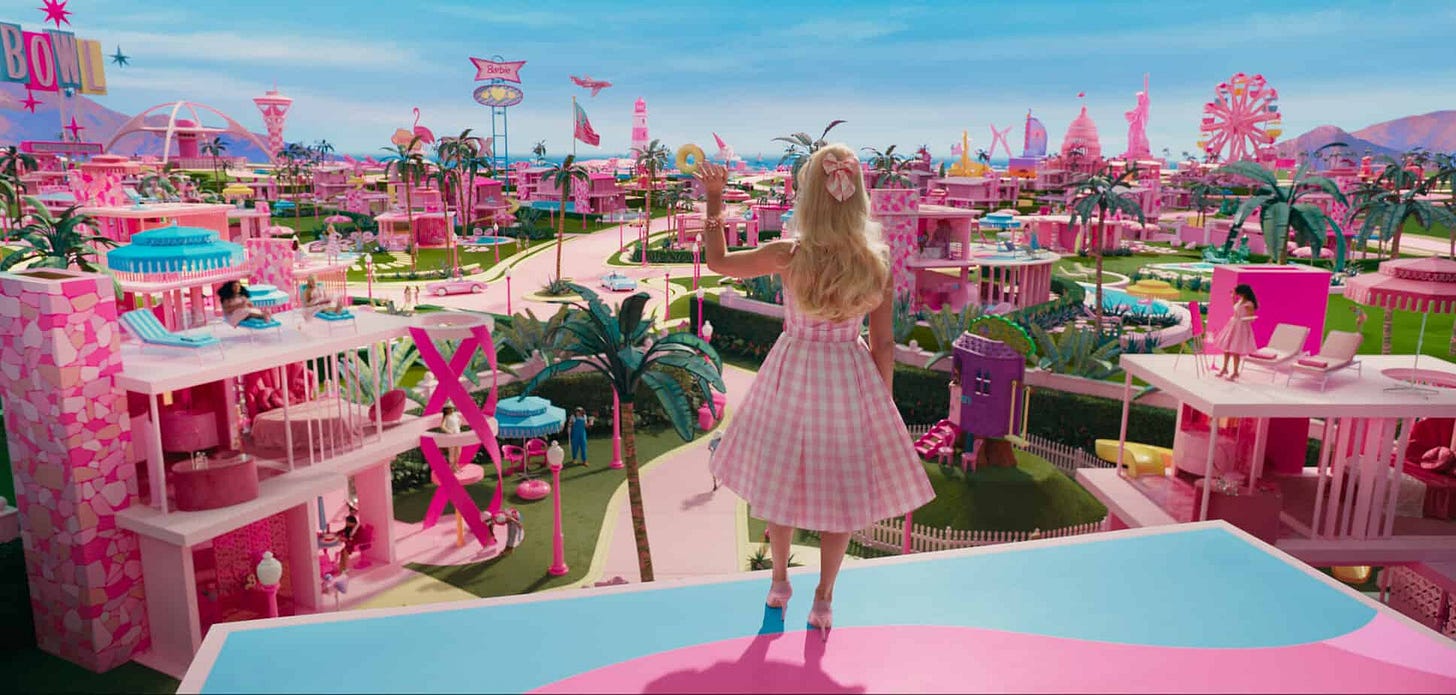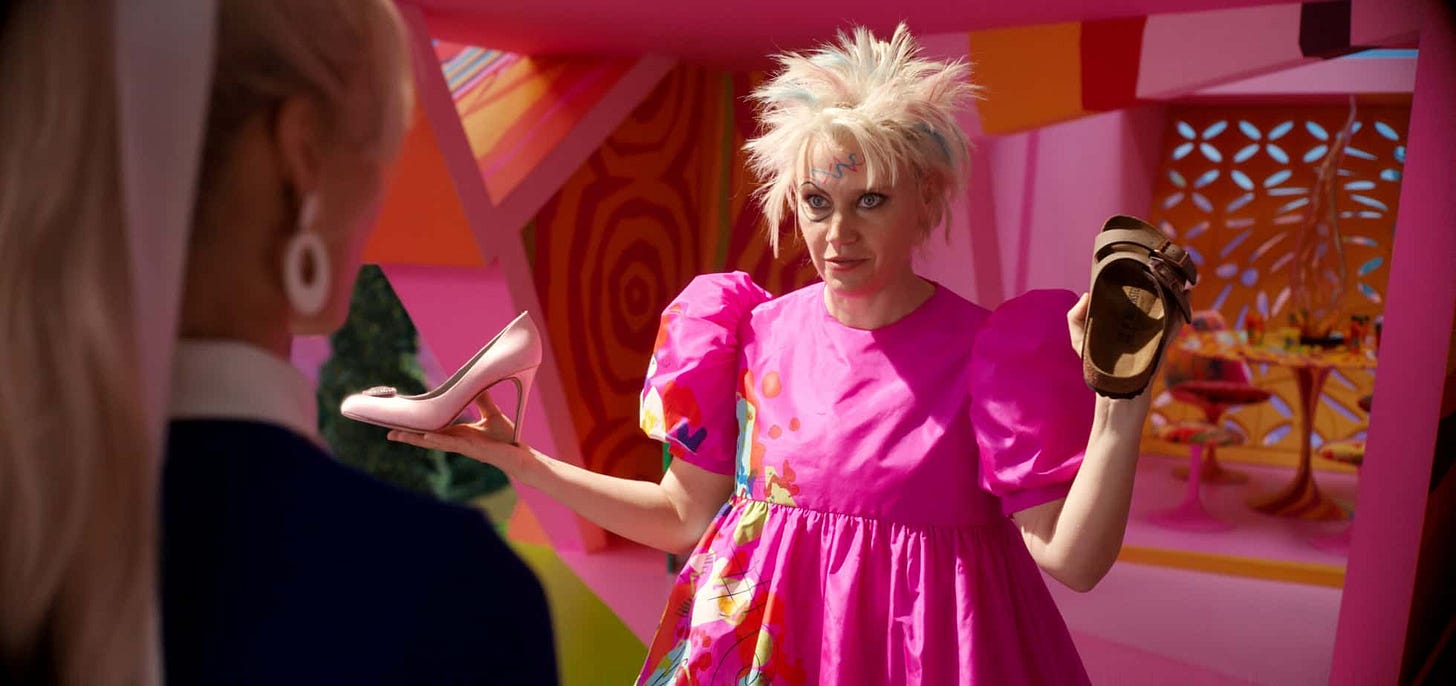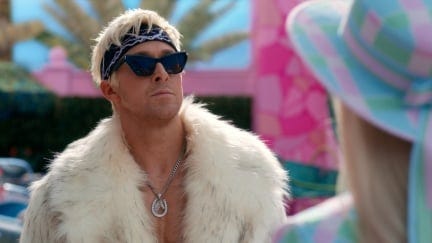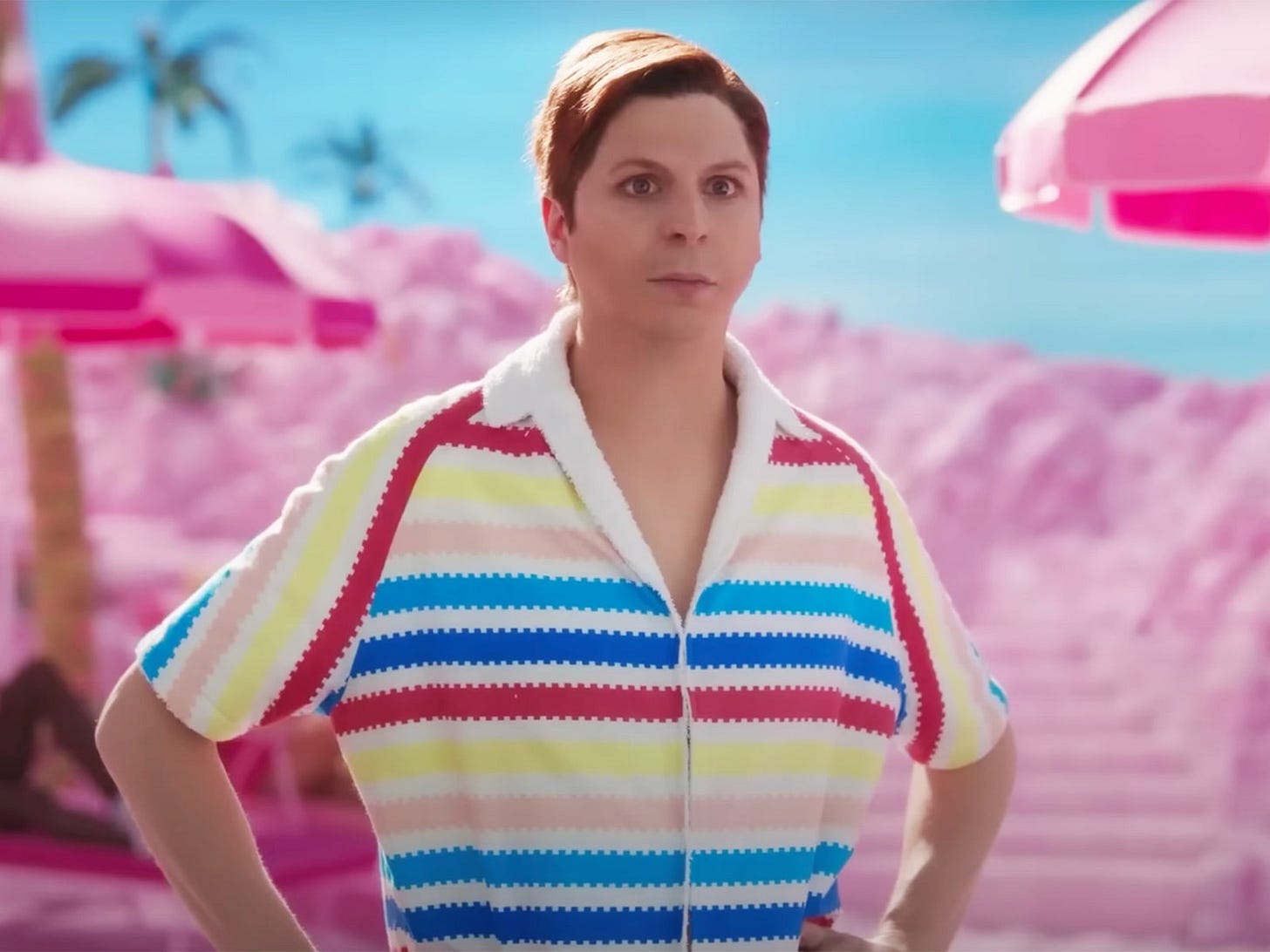barbie is a lot of things. subversive isn't one of them
yes, we can enjoy things. no, that doesn't make those things automatically feminist.
[SPOILER WARNING for literally the entire plot of barbie (2023).]
i went to see barbie in theater with a group of friends. we settled in with our snacks and drinks, eagerly waited for the room to go dark, and then spent the next two hours laughing harder than the rest of the theater (to be fair, everyone else was virtually silent—barbie hasn’t gotten the same hype here as it has in english-speaking countries, and i’m not really sure how well all the jokes translated. “beach you off” comes to mind as one scene that had my friends and i cracking up while the rest of the theater was dead silent). at the end of the movie, we wandered out to the street smiling and giggling, having come to the unanimous consensus: the barbie movie was fun.
what it was not, however, was feminist.
i’m not particularly surprised by the praise the movie has received for its supposed feminism—even before it was released, people seemed determined to position the barbie movie as “empowering.” (a movie where a woman gets to be feminine? take that, patriarchy!) but it’s hard not to feel frustrated by headlines that claim barbie is the “most subversive blockbuster of the 21st century.”1 the overall tone of the critical reception i’ve seen seems to be that even where reviewers acknowledge the constraints of barbie’s radical potential due to its loyalty to brand promotion and capitalist cycles of consumerism, barbie is still praised because it “does much within the material’s inherently commercial parameters.”2
so what, exactly, does barbie actually do?
the foundations of barbieland
barbie begins in a mythical, matriarchal utopia called barbieland, the manifestation of the dreams and fantasies of all the people who play with barbies. foundational to this matriarchal society is, unsurprisingly, gender essentialism; citizens are divided into ‘barbies’ (women) and ‘kens’ (men).3 considering that none of these people have genitals (a fact earnestly proclaimed by barbie herself later in the movie), there is quite literally nothing separating them into these two groups other than strictly constructed gender roles expressed largely through aesthetic signifiers—barbies are hyperfeminine, even when performing ‘masculine’ jobs (the president wears a sparkly sash, the construction workers wear pink jumpsuits, etc.), and kens sport short hair and of course don’t wear skirts or dresses or heels, even though their relative femininity and homosociality compared to ‘real men’ is played up for laughs. essentially, barbieland is rooted in the same gender essentialism of the real world, except here the women get to be girlbosses. feminist win!
from the very start, though, there are cracks in barbieland’s sparkly pink façade. barbies hold all the power and prestige, while kens exist largely to be their arm candy and sidekicks—a fact that not all kens are happy about. furthermore, any barbie who doesn’t conform to barbieland’s gender roles is ostracized, a fact that becomes clear when our main barbie (“stereotypical barbie”) begins to think about death one day, upsetting her friends. the next morning, barbie wakes up and discovers that her feet have become flat, no longer fitting perfectly into her heels—when she shows the other barbies, they exclaim and recoil in disgust, urging her to go get help from “weird barbie” lest she suffer any further deformity.
“weird barbie,” as the name suggests, is the resident gender non-conforming barbie. though it’s through no fault of her own (she was “played with too hard”), she no longer fits the standards expected for a barbie’s appearance (meaning she has a choppy pixie cut and weird makeup) and is therefore ostracized from society, living in a house far removed from the others where she remains out of sight, out of mind until they need her help. clearly, the gender essentialism is not the only thing barbieland has absorbed from the ‘real world’; just like in the real world, any failure to conform with these standards of gender essentialism is punished.
except barbieland is supposed to be a feminist utopia…right?
well, barbie certainly thinks so, because she’s determined to make things go back to the way they were. upon visiting weird barbie, she learns that someone in the real world must be playing with her in a way that causes her gender nonconformity (deformed feet, thoughts of death), and the only way to fix herself is to go to the real world, find the person playing with her, and convince them to stop whatever they’re doing. barbie doesn’t want to go at first, but after discovering—horror of all horrors—that she’s beginning to get ceullulite, she decides to suck it up. the obvious problems with barbie’s disgust about cellulite could be dismissed as satiric, certainly—but considering the simultaneous release of an official barbie-branded anti-cellulite lotion, you’ll have to forgive me if i think ‘it’s satire!’ just doesn’t really cut it in this instance.
either way, we have now set up the conflict that will kickstart the rest of the movie’s plot: barbie, one of the privileged members of a matriarchal society premised on gender essentialism, must undertake a quest to restore her ability to perfectly perform her gender and thus reap the privileges she is afforded by her society. at this point, the film hadn’t lost me yet—it seemed as if the narrative was setting up for a sort of bildungsroman in which barbie might go on her journey only to discover that she shouldn’t be trying to perfectly perform her gender as she always had, that there was more to life than constantly adhering to the pressures created by a society rooted in gender essentialism.
i didn’t have high hopes, but i was curious.
the real world
in the next part of the movie, barbie travels to the real world with ken (her ken, because every barbie has their own. barbieland manages to be heteronormative even without sex!), who she reluctantly agrees to bring along only after some convincing. in the real world, barbie and ken discover that barbieland’s fantasy matriarchy has not actually solved real-world inequality; instead, they are both introduced, for the first time, to patriarchy.
for barbie, the discovery is upsetting; for the first time in her life, she feels disempowered, vulnerable, unsafe. she meets gloria, the woman who’s been playing with her, and sasha, gloria’s daughter, who informs barbie that she hasn’t empowered real-life women so much as made them feel insecure about their bodies. we see at mattel headquarters that the company is entirely run by men, and the ceo is a sexist jerk who only cares about money—a satirization that might feel more poignant were the mattel ceo not, in reality, a multi-millionaire man who is directly profiting off this portrayal. clearly, will ferrell’s acting is not subversive enough to actually threaten the corporation it’s making fun of; conversely, it strengthens that corporation by funneling money into its ceo’s pockets.
but still, barbie’s bildungsroman seems set to continue: she’s learning that there’s more to life than barbieland, that there is perhaps a dark side to gender essentialism which she’s never experienced. if she wants gloria to stop playing with her in a way that gives her unshakeable thoughts of death, then she’ll need to help gloria address the anxiety, loneliness, and dissatisfaction that’s making her play that way in the first place. how will barbie help? will she take steps to address these real world issues she’s encountering?
ken, in the meantime, is delighted by patriarchy. for the first time in his life, he feels respected and important, and it’s all just because he’s a man! here, too, i was intrigued by the charcter arc—i wondered what sort of commentary the film might try to make about the danger of alt-right pipelines for men who feel disenfranchised, the allure of grasping power at others’ expense.
unfortunately, i was destined for disappointment.
back to barbieland
rather than remain in the real world to help gloria, barbie elects instead to take gloria and sasha back to barbieland with her—because everything’s perfect there, so surely that’ll fix things…right?
the only problem is that ken’s already made it back to barbieland first, and he’s brought the gospel of patriarchy with him. somehow, by simply telling everyone that men are meant to be superior to women, he has managed to convince virtually everyone in barbieland to convert society to a patriarchy—kens now hold all positions of power along with all property, and barbies are happily brainwashed waitresses, cheerleaders, and foot masseuses. while some suspension of disbelief is, of course, required for a movie like barbie, the only explanation we receive for this mass brainwashing is a dubious comparison to colonists bringing smallpox to native american populations who had never built up an immunity (because that seems tonally appropriate).
here, the film reaches a point of narrative disjunction: where before it seemed to be following the path of a bildungsroman, with the central conflict focused on barbie’s own internal struggles about having her eyes opened to the real world, the conflict now shifts to an external one: they need to save barbieland from patriarchy!
unfortunately, this is too difficult for barbie. she decides to give up after she turns “ugly”—a scene where we get perhaps the most overt attempt from the movie to assure us of how self-aware it is when, following barbie’s lament about how unattractive she’s become, the voiceover narrator tells the audience not to cast margot robbie if they want to drive this point home. the filmmakers want to make sure that you know that they know how silly it is to have someone as conventionally attractive as robbie complain that she’s “ugly” onscreen. yeah, they decided to do it anyway—but at least they know how unrelatable it is to their audience!
fortunately, gloria and sasha decided to stick around, and gloria’s there to assure barbie that she’s still beautiful (the idea that beauty is not a metric by which we should measure worth in the first place is, apparently, a step too far. instead, barbie wants you to know that everyone can be beautiful—just buy any of the hundreds of barbie-branded beauty products to ‘unlock your inner beauty’ or ‘become the best version of yourself’!). what follows is an impassioned (albeit somewhat contrived) speech in which gloria runs through a list of double standards that women are held to, proclaiming how hard it is to be a woman under patriarchy—a neatly packaged moral appeal, spoonfed to the audience just to make sure that they know this movie is feminist! miraculously, this speech is enough to rouse a nearby brainwashed barbie, because all it takes to throw off the shackles of patriarchy is an acknowledgment that patriarchy is bad. eureka!
smash the (barbie) patriarchy
in barbieland, of course, there is no need to address any of the material conditions that might keep women fettered under patriarchy—instead, patriarchy is simply a matter of mindset. barbie and her cohort work to gather up the brainwashed barbies, one by one, so that gloria can explain to them how much patriarchy sucks. all it takes is the bare minimum of consciousness-raising to prepare for the feminist revolution in barbieland!
once all the barbies have successfully been un-brainwashed, they come up with a plan: they’ll turn the kens against each other by flirting with them to make them jealous (there are no homosexuals in barbieland, presumably, though allan haunts the film in all his implications), and then, while the kens are all fighting, the barbies will vote to restore the constitution to its former matriarchal iteration, turning barbieland back into barbieland. because the legal system that actively upholds your oppression is the best recourse to fight that oppression, ladies!
why do the kens all need to be distracted with a fight if this is a problem that can be solved with a vote, and there are just as many if not more barbies than kens? in what material basis does this constitution get its power from such that simply changing it back will completely restructure soceity? who will have the legal power to organize and approve this vote, if the kens supposedly hold all government positions at the moment?
don’t worry about it, silly! this is barbieland!
everything’s…fixed?
having succeeded with their brilliant plan, the barbies overturn the gender essentialism foundational to their society, eliminating the arbitrary social constructs of ‘barbie’ and ‘ken’ and instead building a new barbieland where any individual can hold any job, positions of power are not restricted based on gender, and the aesthetics of gender roles no longer hold weight such that those who fail to perform them are ostracized.
just kidding! they put the matriarchy back.
but this is good, because…well, it’s girl power! also, the barbies are nice to the kens, most of the time. and the kens just aren’t cut out to lead or govern—it’s not in their nature! but when a ken asks if they can be allowed one supreme court justice, president barbie magnanimously says that she’ll think about looking into a lower circuit court position. and they even apologize to weird barbie for calling her “weird barbie”! where before we had a society rooted in gender essentialism, now we have a slightly different society rooted in gender essentialism. feminism saves the day!
and don’t worry about ken—his investment in patriarchy had nothing to do with any material investment in power. he was just insecure that barbie didn’t like him back! all it takes is one heartfelt conversation with barbie gently encouraging him to find some self-worth outside of his relationship with her, and he’s no longer a misogynist.
patriarchy in the real world, of course, is not as simple. but don’t worry, barbie hasn’t forgotten about it—in fact, the mattel ceo and all his underlings in suits have pursued barbie back to barbieland, just in time to see her and her friends save the day. is this enough to challenge real world patriarchy by changing the heart of mattel’s ceo? well, no—but he does accept gloria’s suggestion to make an “ordinary barbie” after one of his underlings tells him it’ll probably sell well. patriarchy may remain intact outside of barbieland, but at least real women will be able to buy a doll that reassures them that it’s okay to be stressed out sometimes and not look like a supermodel! if they have the money to spare, of course.
with the external conflict resolved, we return to the bildungsroman: barbie’s adventures in the real world have changed her too much to leave her satisfied with life in barbieland. after an emotional conversation with ruth handler, original creator of barbie (who now rents an office in the mattel building), she elects to embrace the imperfection of becoming human. barbie thus returns to the real world and is magically granted a vagina, turning her into a Real Woman.
who doesn’t love a happy ending?
sure, it was fun. no, it wasn’t feminist.
before i go on, let me reiterate: i enjoyed the barbie movie! i laughed at the jokes, i appreciated the acting—i even liked all the pink. my critique of this movie does not preclude me thinking it was fun; pointing out the pitfalls in its politics is not a condemnation of everyone who’s ever enjoyed it. but the fact of the matter is, simply enjoying a movie—or even feeling personally ‘empowered,’ or energized, or seen—does not make that movie subversive. and in barbie’s case, feminism is less a coherent politics and more a tongue-in-cheek marketing strategy.
at its core, the movie’s reification of the gender binary is fundamentally conservative—regardless of how one might argue that it stretches gender roles within that binary, it never breaks away from it and remains firmly invested through to the end of the film. furthermore, the movie doesn’t even provide a salient representation of feminist action that we might use in real life to challenge patriarchy—in fact, within the movie itself, patriarchy in the ‘real world’ is never subverted. it’s almost as if the movie is saying: yeah, we can’t destroy real-life patriarchy. but we can destroy barbie patriarchy, and doesn’t that feel cathartic?
but the reason that barbie patriarchy is so easy to destroy, of course, is that barbie patriarchy makes no attempt at any deeper material analysis of the systems that uphold patriarchy. in barbieland, patriarchy is created from one man’s personal insecurity about his relationship and upheld by ‘brainwashing.’ thus, all that’s needed to destroy it is making sure women understand that patriarchy is bad for them and helping the man who started the whole mess feel less insecure. while consciousness-raising is an important part of feminist action in real life, it is not, in and of itself, enough to bring down patriarchy—especially not when the consciousness-raising happening is relatively agreeable and does nothing to even challenge the thinking of those it targets (because the barbies’ investment in patriarchy does not ever involve them trying to gain material power within a corrupt system; they’re just brainwashed!). and the solution to patriarchy offered at the end of the film is not the destruction of the gender essentialism foundational to gendered oppression—instead, it’s simply flipping the script.
at the end of the day, barbie does not provide any representation of meaningful political action that we might take to challenge real-world patriarchy. in fact, the movie is sort of like an ironic meta-mirror of itself: within barbie, those who can’t destroy patriarchy destroy barbie patriarchy, revel in the catharsis, and go back to the real world feeling as though something meaningful has been accomplished. in real life, we might not be able to destroy patriachy, but we can go see it get destroyed in barbie, revel in the catharsis, and go back to real life feeling as though something meaningful has been accomplished. i can’t help but think of mark fisher’s writing in capitalist realism, where he says,4
…the film performs our anti-capitalism for us, allowing us to continue to consume with impunity. The role of capitalist ideology is not to make an explicit case for something in the way that propaganda does, but to conceal the fact that the operations of capital do not depend on any sort of subjectively assumed belief.
there’s a reason that mattel can poke fun at corporate sexism in its own movie, a reason that a supposedly subversive feminist film can come out of a major hollywood studio: barbie performs our feminism for us, in simple, easy-to-digest terms, leaving us complacent to go forth as happy consumers ready to buy barbie-branded beauty products and reinvest ourselves in the gender roles essential to the film’s premise.5 by walking the line of being just self-aware and satiric enough to assure us that no, really, it’s on our side! the film gets the best of both worlds: praise for its feminist performance and a material impact that is anything but.
but, hey. at least it’s fun!
‘Barbie’ May Be the Most Subversive Blockbuster of the 21st Century, David Fear, 18 July 2023
‘Barbie’ Review: Out of the Box and On the Road, Manohla Dargis, 18 July 2023
obviously, there are outliers like skipper and allan whose names are not ‘barbie’ and ‘ken,’ but they still fall into these two distinct categories of person in barbieland.
Capitalist Realism: Is There No Alternative?, Mark Fisher, 2008
for more on barbie, beauty, and consumerism i highly recommend Barbie Has Cellulite (But You Don’t Have To) by Jessica DeFino









